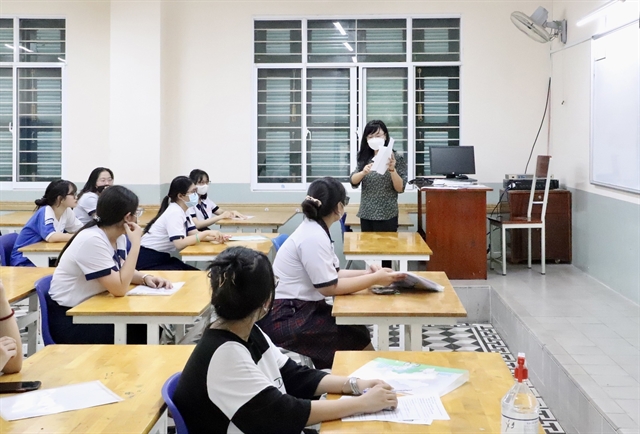 Society
Society

 |
| Students attend an exam at Lê Quý Đôn High School in District 3, HCM City. — VNA/VNS Photo Hồng Giang |
HCM CITY — HCM City has called for schools to diversify assessment methods and avoid sample test questions that students could learn by heart.
The city’s department of education and training said that innovating student evaluation will require teachers to refresh their pedagogical methods.
Tống Thị Mai Hương, principal of Hòa Bình Primary School in District 1, said that while the educators’ workload might increase, this change could better assess the competency of each learner, therefore developing appropriate lesson plans.
She added that to avoid the case where students could learn by heart sample test questions, teachers would pose practical questions on practical application and thinking, rather than theories.
For example, math tests would include practical exercises, while writing tests will focus on questions that evaluate students’ observations.
Meanwhile, other subjects such as science, history and geography will have case-based questions, such as how to save electricity and water, Hương said.
New teaching methods also create more space for students to raise their voices.
Hương said: “It is about teaching students how to do, not to know.”
In recent years, students of HCM City have become familiar with tests conducted in museums, on buses, or in interdisciplinary projects in which students can assume different roles, such as designing and executing the plan. In these programmes, teachers only act as the initiator and evaluator.
Nguyễn Viết Đăng Du, a teacher from Lê Quý Đôn High School in District 3, said that nowadays, tests are more about the students’ skills rather than memory capacity.
He added that while testing is only a small part of practical education, it has great importance.
Du believed that teachers also need to go along with this change, which means that they have to determine which competencies in students they want to assess.
Du said: “For example, back in the day, tests only assessed students’ memory capacity, therefore, they require learning by heart. Those that didn’t possess this ability would cheat to achieve the desired results.
“The new methods of assessment focus on skills and how students use and transform the knowledge they learn.
“They don’t need to learn textbooks by heart and can seek information on the internet, and on that basis creating their own products, which the teachers will evaluate.”
Nguyễn Bảo Quốc, deputy director of HCM City’s Education and Training Department said that the new regulation that advises against sample tests and learning by heart aims to innovate the teaching and studying process at educational institutions.
It focuses on requiring students to come up with ideas and express them in a coherent, persuasive manner.
Quốc said: “Teachers will focus on requiring and guiding students to perform the steps to create a text.
“At each step, teachers can utilise illustrations in a logical manner, helping learners understand the format, language, and expression method of each type of text.”
He added that the city’s education and training department has issued guidelines for designing tests and assessments.
Test questions and exercises will require students to apply the knowledge and skills they learn in new contexts and materials.
Semester and final examinations will also not contain materials in textbooks to accurately evaluate students’ competencies, and avoid cases where learners memorise or copy from existing texts.
Regarding the cases where several education institutions increase the number of tests for students, the department required schools not to add more tests than regulations allow, avoiding putting more pressure on students.
The content and length of the tests also need to fit the curriculum and students’ respective study levels.
For the evaluation to bring in practical and accurate results, the department said it has built an assessment toolkit to limit the subjectivity of the scorers. — VNS




